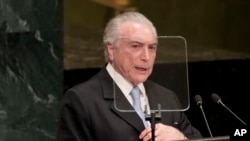Brazil's new president, Michel Temer, told the U.N. General Assembly on Tuesday that the impeachment of his predecessor was conducted with "absolute respect" for the rule of law and that confidence was returning to the country's battered economy.
Temer, who was sworn in after Dilma Rousseff was dismissed by Congress on August 31, said his task now was to restore economic growth and create work for millions of Brazilians who have lost their jobs in the worst recession since the 1930s.
His U.N. appearance was part of an effort by his government to attract investment to South America's biggest economy while dispelling questions about his legitimacy as president after the rancorous impeachment of Rousseff that divided Brazil.
Her removal from office was carried out within the rules set by Congress and the Supreme Court, he said. "The process took place in absolute respect to the constitutional order."
Brazil's Senate convicted Rousseff, the country's first female president, of breaking budget rules, marking the end of 13 years of leftist Workers' Party rule. Temer, who was Rousseff's vice president, will serve out her term through 2018.
"We are clear that the way forward is to take the path of fiscal responsibility and social responsibility," Temer said. "Confidence is being restored."
Budget deficit
Investors are watching Temer's steps to plug a budget deficit that has ballooned to 10 percent of GDP from 3 percent in 2013. Brazil's currency has strengthened and the stock market has surged on the ouster of Rousseff, but doubts remain about Temer's commitment to curbing profligate public spending.
He is known as a quiet, calculating political dealmaker unencumbered by ideology.
He honed his craft over several years in Brazil's bare-knuckle lower house of Congress, where he was an ally to both centrist President Fernando Henrique Cardoso and leftist leader Luiz Inacio Lula da Silva.
Temer's pro-business program includes a multibillion-dollar plan to auction off oil, power rights and infrastructure concessions to try to bolster private investment to revive a moribund economy.
Temer, part of a regional shift toward the political right, has sought to offset criticism of planned austerity measures by denying that a proposed ceiling on public spending would affect health and education expenditures.
In neighboring Argentina, the November election of free-markets advocate Mauricio Macri as president put another center-right leader in charge of a major South American economy after years of leftist rule.





